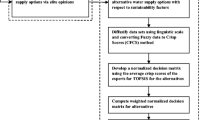Abstract
The management of water resources in medium and large cities has been changing in recent years, mainly as a result of climate change and the sharp increase of urbanization. In addition to the traditional solution of expansion of water supply, an approach that integrates technological alternatives of demand management in the infrastructure of urban constructions is proposed herein. However, these facilities are often more complex and expensive than conventional ones, being also challenging to achieve a balance between costs and benefits. While the environmental, social, and engineering benefits seem obvious, expressing them in monetary terms is usually a challenge that cost-effectiveness do not respond satisfactorily. Therefore, this research uses the Fuzzy Analytic Hierarchy Process multiple criteria method to rank three main alternatives (rainwater harvesting system, gray water recycling system, and water saving devices) that can be applied in low-income residences in Brazil. For this purpose, this paper considers criteria normally used in this type of analysis such as economic, technical, environmental and social criteria but also includes the local population acceptance and the evaluation of experts. The main results suggest that the most appropriate alternative is the use of water saving devices and that there is also a need for public policies that offer financial incentives to the population and prevent socioeconomic conditions from inhibiting the adoption of water conservation practices.





Similar content being viewed by others
References
ABNT – Brazilian Technical Standards Association (1989) NBR 10844 – draininge of roofs and paved areas – code of practica – procedure. Rio de Janeiro
ABNT – Brazilian Technical Standards Association (1997a) NBR 13969 – septic tank – units for treatment and disposal of liquid effluents – project, construction and operation. Rio de Janeiro
ABNT – Brazilian Technical Standards Association (1997b) NBR 7229 – design, construction and operation of septic tank systems. Rio de Janeiro
ABNT – Brazilian Technical Standards Association (2007) NBR 15527 – rainwater – catchment of roofs in urban areas for non-potable purposes – requirements. Rio de Janeiro
Aguarón J, Escobar MT, Moreno-Jiménez JM (2016) The precise consistency consensus matrix in a local AHP-group decision making context. Ann Oper Res 245(1–2):245–259. https://doi.org/10.1007/s10479-014-1576-8
Albuquerque Neto RF, De Julio M (2014) Estudo de técnicas sustentáveis para racionalização do uso de água em edificações com enfoque na demanda. Revista de Engenharia e Tecnologia 6(2):85–103
Bouziotas D, Rozos E, Makropoulos C (2015) Water and the city: exploring links between urban growth and water demand management. J Hydroinf 17(2):176–192. https://doi.org/10.2166/hydro.2014.053
Buckley JJ (1985) Fuzzy hierarchical analysis. Fuzzy Sets Syst 17(3):233–247
Darbandsari P, Kerachian R, Malakpour-Estalaki S (2017) An agent-based behavioral simulation model for residential water demand management: the case-study of Tehran, Iran. Simul Model Pract Theory 78:51–72. https://doi.org/10.1016/j.simpat.2017.08.006
Guedes MJF, Ribeiro MMR, Vieira ZMCL (2014) Alternativas de gerenciamento da demanda de água na escala de uma cidade. Brazilian Journal of Water Resources 19(3):51–62. https://doi.org/10.21168/rbrh.v19n2.p123-134
Jaiswal RK, Ghosh NC, Lohani AK, Thomas T (2015) Fuzzy AHP based multi criteria decision support for watershed prioritization. Water Resour Manag 29(12):4205–4227. https://doi.org/10.1007/s11269-015-1054-3
Kaya T, Kahraman C (2011) An integrated fuzzy AHP-ELECTRE methodology for environmental impact assessment. Expert Syst Appl 38(7):8553–8562. https://doi.org/10.1016/j.eswa.2011.01.057
Maggioni E (2015) Water demand management in times of drought: what matters for water conservation. Water Resour Res 51(1):125–139. https://doi.org/10.1002/2014WR016301
Malczewski J (1999) GIS and multicriteria desision analysis. John Willey and Sons Inc, New York
Marlow DR, Moglia M, Cook S, Beale DJ (2013) Towards sustainable urban water management: a critical reassessment. Water Res 47(20):7150–7161. https://doi.org/10.1016/j.watres.2013.07.046
Monte MBS, Almeida-Filho AT (2016) A multicriteria approach using MAUT to assist the maintenance of a water supply system located in a low-income community. Water Resour Manag 30(9):3093–3106. https://doi.org/10.1007/s11269-016-1333-7
Price JI, Chermak JM, Felardo J (2014) Low-flow appliances and household water demand: an evaluation of demand-side management policy in Albuquerque, New Mexico. J Environ Manag 133:37–44. https://doi.org/10.1016/j.jenvman.2013.11.025
Rathnayaka K, Malano H, Arora M, George B, Maheepala S, Nawarathna B (2017) Prediction of urban residential end-use water demands by integrating known and unknown water demand drivers at multiple scales II: model application and validation. Resour Conserv Recycl 118:1–12. https://doi.org/10.1016/j.resconrec.2016.11.015
Saaty TL (1980) The analytic hierarchy process. McGraw-Hill, New York
Santana RA, Bezerra STM, Santos SM, Coutinho AP, Coelho ICL, Pessoa RVS (2019) Assessing alternatives for meeting water demand: a case study of water resource management in the Brazilian semiarid region. Util Policy 61(2019):100974. https://doi.org/10.1016/j.jup.2019.100974
SNIS – Brazilian National Sanitation Information System (2016) Diagnóstico dos serviços de água e esgotos 2014. Secretaria Nacional de Saneamento Ambiental, Brasília
Speed R, Li Y, Le Quesne T et al (2013) Basin water allocation planning: principles, procedures and approaches for basin allocation planning. United Nations Educational, Scientific and Cultural Organization, Paris
Stec A, Kordana S (2015) Analysis of profitability of rainwater harvesting, gray water recycling and drain water heat recovery systems. Resources, conservation and recycling 105(Part A):84–94. https://doi.org/10.1016/j.resconrec.2015.10.006
Tomaz P (2001) Economia de água para empresas e residências: Um estudo atualizado sobre o uso racional de água. Navegar, 2th Edition, São Paulo
Tortajada C, Joshi YK (2013) Water demand management in Singapore: involving the public. Water Resour Manag 27(8):2729–2746. https://doi.org/10.1007/s11269-013-0312-5
Vieira P, Jorge C, Covas D (2017) Assessment of household water use efficiency using performance indices. Resour Conserv Recycl 116:94–106. https://doi.org/10.1016/j.resconrec.2016.09.007
Xiao Y, Hipel KW, Fang L (2016) Incorporating water demand management into a cooperative water allocation framework. Water Resour Manag 30(9):2997–3012. https://doi.org/10.1007/s11269-016-1322-x
Acknowledgments
This research was financially supported by the Foundation for the Support of Science and Technology of the State of Pernambuco (FACEPE).
Author information
Authors and Affiliations
Corresponding author
Ethics declarations
Conflict of Interest
The authors declare that they have no conflict of interest.
Additional information
Publisher’s Note
Springer Nature remains neutral with regard to jurisdictional claims in published maps and institutional affiliations.
Rights and permissions
About this article
Cite this article
dos Santos Amorim, J.M.B., Bezerra, S.d.T.M., Silva, M.M. et al. Multicriteria Decision Support for Selection of Alternatives Directed to Integrated Urban Water Management. Water Resour Manage 34, 4253–4269 (2020). https://doi.org/10.1007/s11269-020-02671-9
Received:
Accepted:
Published:
Issue Date:
DOI: https://doi.org/10.1007/s11269-020-02671-9




